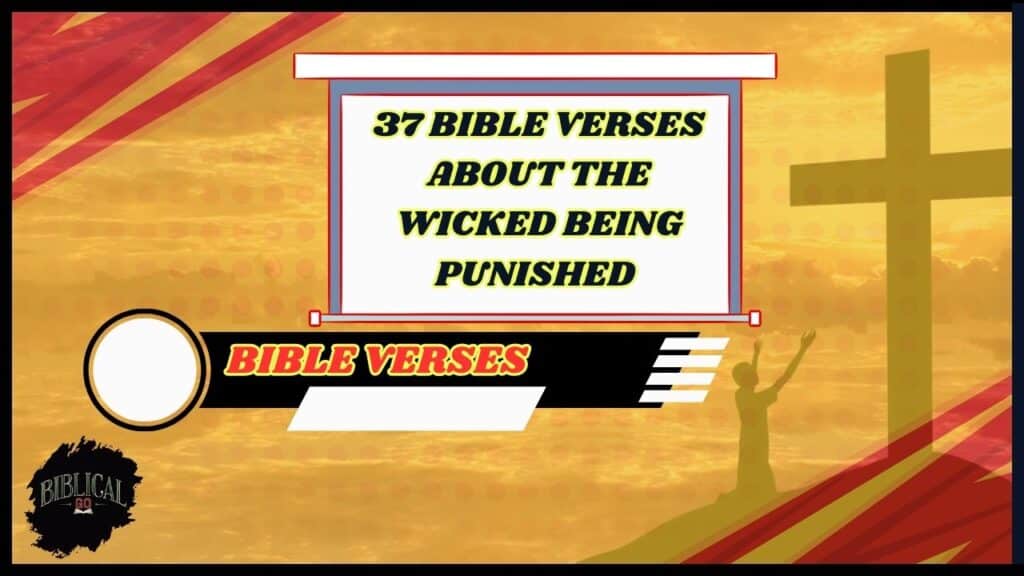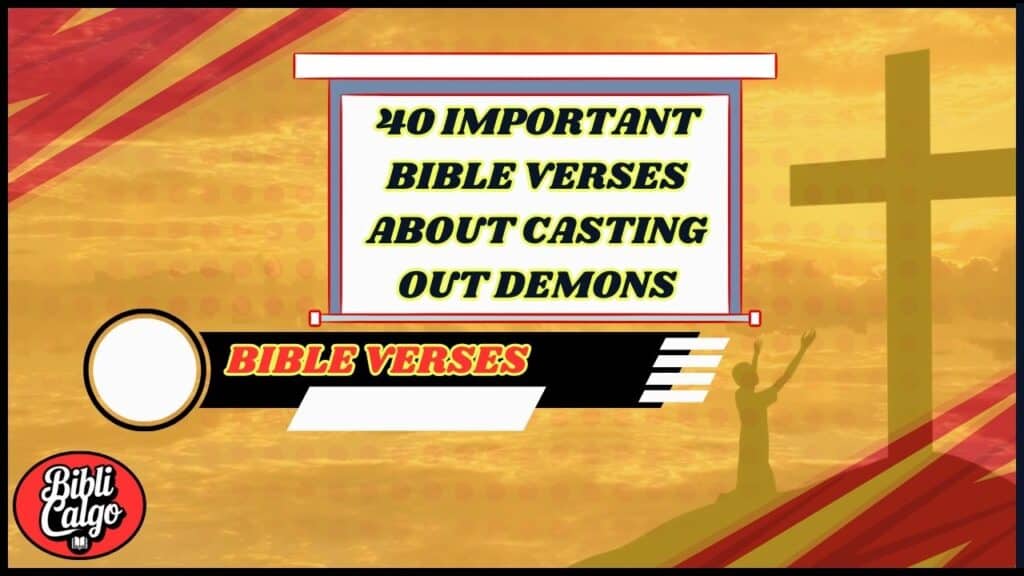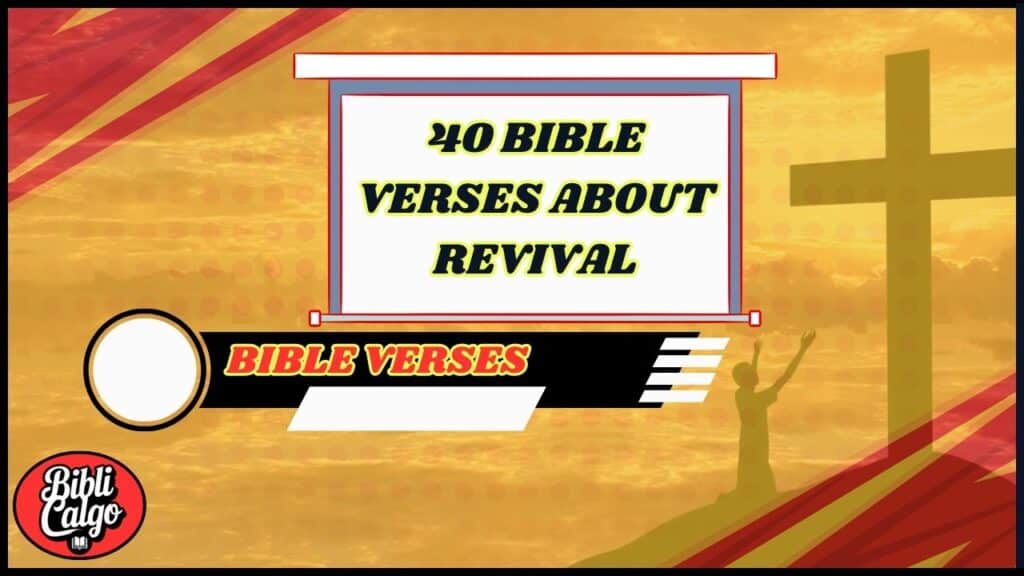Bible Verses About the Wicked Being Punished: Scripture has much to say about justice and divine retribution. While God is merciful and patient, the Bible consistently affirms that wickedness will not go unpunished forever.
These verses serve as both warnings and reassurances warnings to those who might choose evil paths, and reassurance to the righteous that God sees all injustice.
Understanding these passages helps us develop a complete picture of God’s character. He is not only loving and gracious but also just and holy, unable to tolerate sin indefinitely. These verses remind us that we serve a God who will ultimately make all things right, even when human justice fails.
As we explore these powerful scriptures, remember they’re not meant to inspire vengeance but to affirm God’s sovereignty and justice in a world that often seems to reward wrongdoing.
The Certainty of Divine Justice
1. Psalm 37:9-10
“For the evildoers shall be cut off, but those who wait for the Lord shall inherit the land. In just a little while, the wicked will be no more; though you look carefully at his place, he will not be there.”
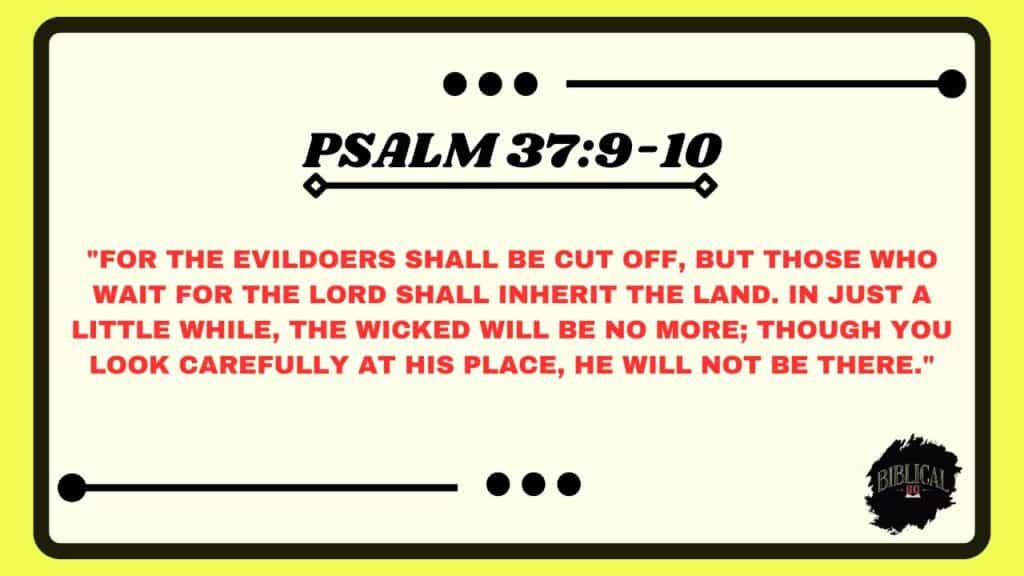
These verses assure us that evil’s triumph is always temporary. God promises that those who persist in wickedness will eventually face consequences, while those who faithfully wait on God will receive their inheritance. When injustice seems to prevail, remember that God operates on a timeline beyond our immediate perception.
2. Proverbs 11:21
“Be assured, the wicked will not go unpunished, but the offspring of the righteous will be delivered.”
Solomon offers absolute certainty that wickedness faces judgment. The contrast between the fate of the wicked and the righteous highlights God’s commitment to justice and protection over those who follow Him. This verse encourages us to take the long view, trusting God’s ultimate justice even when immediate circumstances suggest otherwise.
3. Isaiah 13:11
“I will punish the world for its evil, and the wicked for their iniquity; I will put an end to the pomp of the arrogant, and lay low the pompous pride of the ruthless.”
God declares His intention to address both widespread evil and individual wickedness. Pride and arrogance particularly provoke divine justice. This verse reminds us that no one regardless of power or position stands beyond God’s reach when they embrace wickedness.
4. Romans 12:19
“Beloved, never avenge yourselves, but leave it to the wrath of God, for it is written, ‘Vengeance is mine, I will repay, says the Lord.'”
Paul instructs believers to resist taking revenge, reminding us that God has reserved the right of judgment for Himself. This verse isn’t celebrating punishment but establishing boundaries for human behavior. When wronged, we can release our need for vindication, knowing God will address injustice perfectly in His time.
5. 2 Thessalonians 1:6-8
“God is just: He will pay back trouble to those who trouble you and give relief to you who are troubled, and to us as well. This will happen when the Lord Jesus is revealed from heaven in blazing fire with his powerful angels. He will punish those who do not know God and do not obey the gospel of our Lord Jesus.”
Paul reassures persecuted believers that God sees their suffering and will bring both justice to oppressors and relief to the oppressed. The ultimate expression of divine justice arrives with Christ’s return. This passage reminds us that final justice may not arrive in this lifetime but is nevertheless certain.
Also Read: 35 Important Bible Verses About Storms (Explained)
God’s Judgment in History
6. Genesis 6:5-7
“The Lord saw that the wickedness of man was great in the earth, and that every intention of the thoughts of his heart was only evil continually. And the Lord regretted that he had made man on the earth, and it grieved him to his heart. So the Lord said, ‘I will blot out man whom I have created from the face of the land…'”
This passage reveals God’s response to humanity’s thoroughgoing corruption before the flood. His grief over human wickedness demonstrates that judgment comes not from divine indifference but from a heart pained by evil. When society celebrates corruption, remember that God is neither blind nor uncaring.
7. Genesis 19:24-25
“Then the Lord rained on Sodom and Gomorrah sulfur and fire from the Lord out of heaven. And he overthrew those cities, and all the valley, and all the inhabitants of the cities, and what grew on the ground.”
The destruction of Sodom and Gomorrah stands as one of the Bible’s clearest examples of divine judgment. These cities embodied profound moral corruption that ultimately demanded response. This account reminds us that societies, not just individuals, face accountability for systemic wickedness.
8. Exodus 14:27-28
“So Moses stretched out his hand over the sea, and the sea returned to its normal course when the morning appeared. And as the Egyptians fled into it, the Lord threw the Egyptians into the midst of the sea. The waters returned and covered the chariots and the horsemen; of all the host of Pharaoh that had followed them into the sea, not one of them remained.”
The destruction of Pharaoh’s army demonstrates God’s intervention on behalf of the oppressed. After repeated warnings and opportunities to relent, Pharaoh’s persistent hardness of heart led to disaster. This passage shows that God ultimately vindicates those who suffer under tyranny and oppression.
9. Numbers 16:31-33
“And as soon as he had finished speaking all these words, the ground under them split apart. And the earth opened its mouth and swallowed them up, with their households and all the people who belonged to Korah and all their goods. So they and all that belonged to them went down alive into Sheol, and the earth closed over them, and they perished from the midst of the assembly.”
The rebellion of Korah resulted in swift and dramatic judgment, confirming Moses’ authority. This unusual punishment demonstrated the seriousness of challenging God’s appointed leadership. When tempted to rebel against legitimate spiritual authority, remember that such actions may carry serious consequences.
10. 1 Samuel 31:3-6
“The battle pressed hard against Saul, and the archers found him, and he was badly wounded by the archers. Then Saul said to his armor-bearer, ‘Draw your sword, and thrust me through with it, lest these uncircumcised come and thrust me through, and mistreat me.’ But his armor-bearer would not, for he feared greatly. Therefore Saul took his own sword and fell upon it… Thus Saul died, and his three sons, and his armor-bearer, and all his men, on the same day together.”
Saul’s tragic end follows years of disobedience and rebellion against God. His death illustrates the eventual consequences of persistent rejection of divine guidance. This account encourages us to maintain spiritual humility, recognizing that even those in positions of authority must remain accountable to God.
Also Read: 36 Bible Verses About Removing People From Your Life
Punishment Fitting the Crime
11. Galatians 6:7-8
“Do not be deceived: God is not mocked, for whatever one sows, that will he also reap. For the one who sows to his own flesh will from the flesh reap corruption, but the one who sows to the Spirit will from the Spirit reap eternal life.”
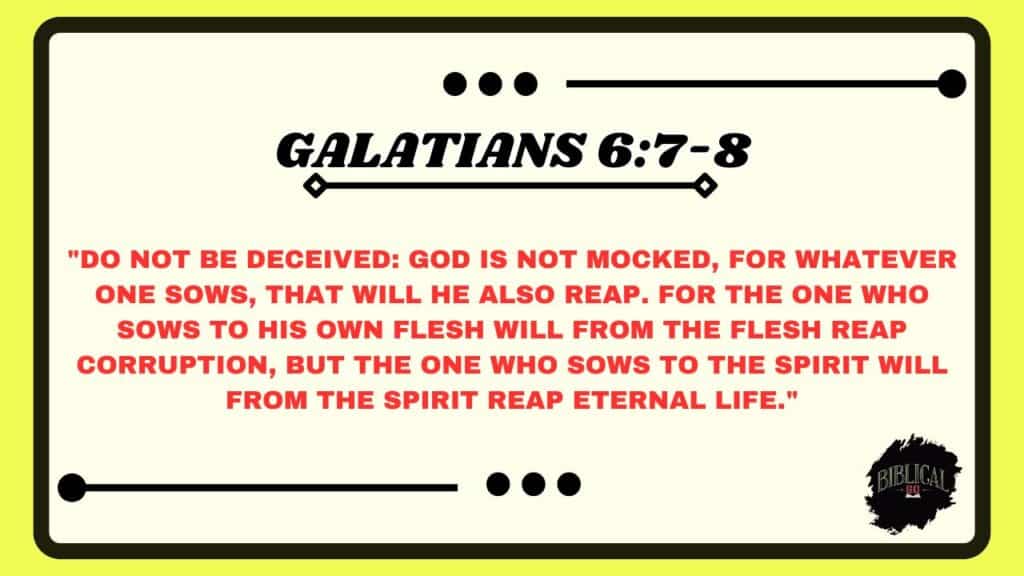
Paul describes the natural connection between actions and consequences. This principle operates both naturally and spiritually, with wickedness producing internal corruption even before external judgment. Recognize that every decision plants seeds that will eventually produce a harvest either positive or negative.
12. Psalm 7:15-16
“He makes a pit, digging it out, and falls into the hole that he has made. His mischief returns upon his own head, and on his own skull his violence descends.”
David poetically describes how evil often becomes self-destructive. Those who plot harm frequently become entangled in their own schemes. This principle encourages us to reject the temptation to respond to evil with evil, knowing that wickedness often creates its own punishment.
13. Proverbs 26:27
“Whoever digs a pit will fall into it, and a stone will come back on him who starts it rolling.”
Similar to the previous verse, this proverb highlights the frequent boomerang effect of wicked schemes. The images of falling into one’s own trap emphasize divine justice operating through natural consequences. When tempted to manipulate or harm others, remember that such actions often backfire unexpectedly.
14. Obadiah 1:15
“For the day of the Lord is near upon all the nations. As you have done, it shall be done to you; your deeds shall return on your own head.”
This prophecy against Edom establishes a simple principle: God’s justice often mirrors the offender’s actions. Nations that inflict suffering often experience similar suffering themselves. This verse encourages us to treat others justly, knowing we may experience treatment similar to what we give.
15. Matthew 26:52
“Then Jesus said to him, ‘Put your sword back into its place. For all who take the sword will perish by the sword.'”
Jesus warns Peter that violence tends to create cycles of retaliation. Those who embrace violence often become its victims. This principle encourages us to break cycles of retaliation by choosing peaceful responses even when provoked.
The Purpose of Divine Punishment
16. Ezekiel 18:23
“Have I any pleasure in the death of the wicked, declares the Lord God, and not rather that he should turn from his way and live?”
God reveals His deeper desire behind judgment the redemption and restoration of the wicked. Punishment is never God’s preferred outcome but follows persistent rejection of opportunities to repent. This verse reminds us to share God’s heart in hoping for the reformation rather than destruction of those who do evil.
17. Ezekiel 33:11
“Say to them, As I live, declares the Lord God, I have no pleasure in the death of the wicked, but that the wicked turn from his way and live; turn back, turn back from your evil ways, for why will you die, O house of Israel?”
God’s passionate appeal reaffirms that punishment comes only after rejected opportunities for repentance. His question “why will you die?” reveals divine heartbreak over human self-destruction. This passage encourages us to respond to God’s ongoing invitations to return to Him before consequences become irreversible.
18. 2 Peter 3:9
“The Lord is not slow to fulfill his promise as some count slowness, but is patient toward you, not wishing that any should perish, but that all should reach repentance.”
Peter explains that God’s patience with evil demonstrates His merciful desire for universal repentance. What appears as divine inaction is actually compassionate restraint. This verse reminds us that God’s apparent delay in judgment comes from mercy, not indifference or impotence.
19. Lamentations 3:31-33
“For the Lord will not cast off forever, but, though he cause grief, he will have compassion according to the abundance of his steadfast love; for he does not afflict from his heart or grieve the children of men.”
Jeremiah acknowledges that even divine punishment has limits. God’s deeper nature inclines toward compassion rather than punishment. This passage reminds us that judgment, though sometimes necessary, never represents God’s fullest expression or deepest desire.
20. Isaiah 26:9-10
“When your judgments are in the earth, the inhabitants of the world learn righteousness. If favor is shown to the wicked, he does not learn righteousness; in the land of uprightness he deals corruptly and does not see the majesty of the Lord.”
Isaiah reveals an educational purpose behind divine judgment teaching humanity the nature of righteousness. Without consequences, the wicked often remain blind to their need for change. This verse helps us understand that judgment can serve the positive purpose of awakening moral consciousness.
Also Read: 35 Important Bible Verses About Overcomer
The Final Judgment
21. Revelation 20:12-13
“And I saw the dead, great and small, standing before the throne, and books were opened. Then another book was opened, which is the book of life. And the dead were judged by what was written in the books, according to what they had done. And the sea gave up the dead who were in it, Death and Hades gave up the dead who were in them, and they were judged, each one of them, according to what they had done.”
John’s vision depicts universal accountability at history’s conclusion. No one regardless of status or circumstances escapes divine evaluation. This sobering image reminds us that our actions carry eternal significance and will ultimately face perfect assessment.
22. Matthew 25:41-43
“Then he will say to those on his left, ‘Depart from me, you cursed, into the eternal fire prepared for the devil and his angels. For I was hungry and you gave me no food, I was thirsty and you gave me no drink, I was a stranger and you did not welcome me, naked and you did not clothe me, sick and in prison and you did not visit me.'”
Jesus describes judgment based on practical treatment of the vulnerable. Significantly, the condemned are judged not for dramatic evils but for failures of compassion. This passage challenges us to recognize that wickedness includes not only active harm but also passive indifference to suffering.
23. 2 Thessalonians 1:9
“They will suffer the punishment of eternal destruction, away from the presence of the Lord and from the glory of his might.”
Paul describes eternal punishment primarily as separation from God’s presence. The absence of relationship with the divine represents the ultimate consequence of persistent rejection. This verse invites us to recognize that life apart from God ultimately leads to an existence defined by that separation.
24. Malachi 4:1
“For behold, the day is coming, burning like an oven, when all the arrogant and all evildoers will be stubble. The day that is coming shall set them ablaze, says the Lord of hosts, so that it will leave them neither root nor branch.”
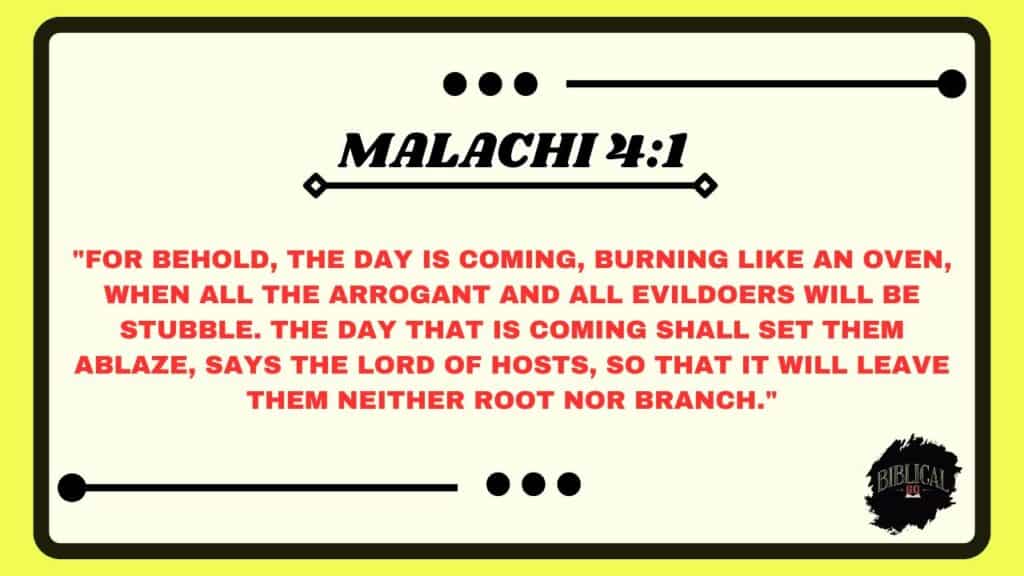
The prophet describes divine judgment as thoroughly consuming wickedness. The metaphor suggests that evil will be completely eliminated rather than merely contained. This verse offers hope that evil’s power will not persist forever but will face complete eradication.
25. Revelation 21:8
“But as for the cowardly, the faithless, the detestable, as for murderers, the sexually immoral, sorcerers, idolaters, and all liars, their portion will be in the lake that burns with fire and sulfur, which is the second death.”
John’s vision identifies specific categories of wickedness facing judgment. The diverse list includes both dramatic evils and more subtle spiritual failures. This comprehensive accounting reminds us that God evaluates not just external behavior but also internal spiritual orientation.
Also Read: 34 Bible Verses About Blooming Where You Are Planted
Divine Protection of the Righteous
26. Psalm 34:15-16
“The eyes of the Lord are toward the righteous and his ears toward their cry. The face of the Lord is against those who do evil, to cut off the memory of them from the earth.”
David contrasts God’s attentiveness toward the righteous with His opposition to evildoers. This dual focus demonstrates divine commitment to both protect the vulnerable and address those who harm them. When facing persecution, remember that God sees both your suffering and those causing it.
27. Psalm 91:7-8
“A thousand may fall at your side, ten thousand at your right hand, but it will not come near you. You will only look with your eyes and see the recompense of the wicked.”
The psalmist describes divine protection amid widespread judgment. The righteous witness but do not experience the consequences facing the wicked. This promise encourages faithful living even when surrounded by evil, knowing God distinguishes between the righteous and the wicked.
28. Proverbs 3:33
“The Lord’s curse is on the house of the wicked, but he blesses the dwelling of the righteous.”
Solomon contrasts the divine attitude toward different types of households. While wickedness attracts divine opposition, righteousness invites blessing. This principle encourages us to cultivate homes characterized by godliness rather than corruption.
29. Isaiah 3:10-11
“Tell the righteous that it shall be well with them, for they shall eat the fruit of their deeds. Woe to the wicked! It shall be ill with him, for what his hands have dealt out shall be done to him.”
Isaiah announces contrasting futures for the righteous and wicked. Both experience outcomes aligned with their actions, highlighting divine justice. This clear distinction motivates righteous living by connecting it to positive outcomes while warning against wickedness.
30. 2 Peter 2:9
“Then the Lord knows how to rescue the godly from trials, and to keep the unrighteous under punishment until the day of judgment.”
Peter reassures believers of God’s dual capability both rescuing the righteous and restraining the wicked. This balanced divine activity ensures appropriate outcomes for different moral choices. When facing opposition from the wicked, remember that God knows how to both deliver you and address your oppressors.
Also Read: 38 Important Bible Verses About Resilience (Explained)
The Righteous Response to Wickedness
31. Psalm 37:1-2
“Fret not yourself because of evildoers; be not envious of wrongdoers! For they will soon fade like the grass and wither like the green herb.”
David counsels believers against both anxiety and envy regarding the wicked. Their apparent prosperity proves temporary and insubstantial. When evil appears to prosper, maintain perspective on its fleeting nature rather than becoming consumed with worry or resentment.
32. Proverbs 24:19-20
“Fret not yourself because of evildoers, and be not envious of the wicked, for the evil man has no future; the lamp of the wicked will be put out.”
Similar to the previous passage, this proverb urges emotional detachment from apparent evil success. The wicked lack lasting hope or illumination. When tempted to envy those who gain through wrongdoing, remember that such gains ultimately prove worthless without a secure future.
33. Matthew 5:44-45
“But I say to you, Love your enemies and pray for those who persecute you, so that you may be sons of your Father who is in heaven. For he makes his sun rise on the evil and on the good, and sends rain on the just and on the unjust.”
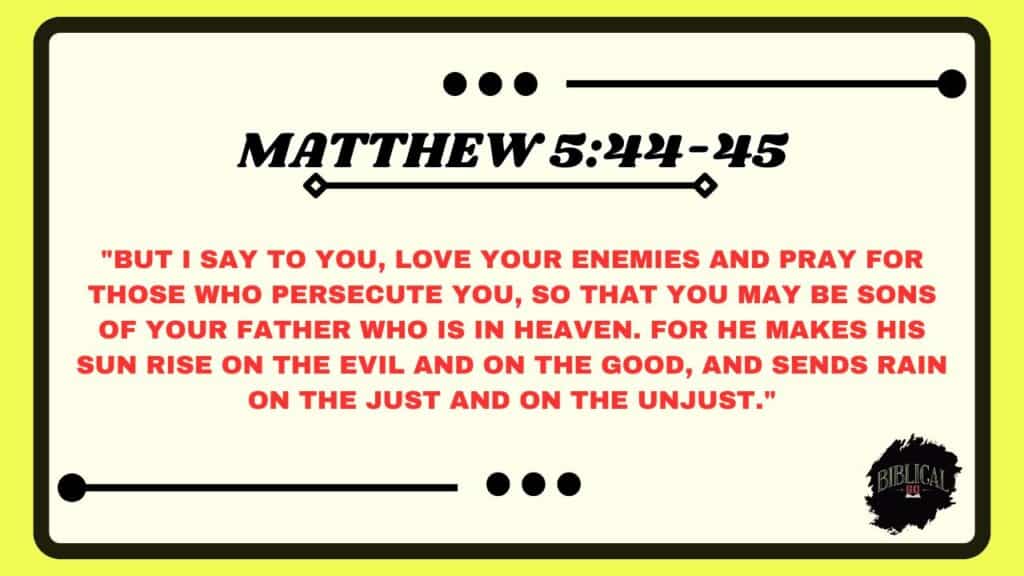
Jesus commands a radical response to those who harm us love and prayer rather than hatred. This approach reflects God’s impartial provision of basic blessings to all humanity. When wronged, resist natural retaliatory instincts and instead demonstrate supernatural love that reflects divine character.
34. Romans 12:17-18
“Repay no one evil for evil, but give thought to do what is honorable in the sight of all. If possible, so far as it depends on you, live peaceably with all.”
Paul prohibits personal retaliation while encouraging proactive peacemaking. Christians must break cycles of vengeance rather than perpetuating them. When wronged, focus on maintaining your own integrity rather than matching the moral failure of your opponent.
35. 1 Peter 3:9
“Do not repay evil for evil or reviling for reviling, but on the contrary, bless, for to this you were called, that you may obtain a blessing.”
Peter calls believers to counter-cultural responses blessing those who harm us. This approach participates in our spiritual calling and connects to divine blessing. When facing mistreatment, view it as an opportunity to demonstrate spiritual maturity through unexpected blessing rather than predictable retaliation.
36. Proverbs 24:17-18
“Do not rejoice when your enemy falls, and let not your heart be glad when he stumbles, lest the Lord see it and be displeased, and turn away his wrath from him.”
Solomon warns against taking pleasure in an enemy’s misfortune. Such satisfaction displeases God and may actually interrupt divine judgment. When those who have wronged you experience consequences, guard your heart against vindictive celebration that diminishes your spiritual integrity.
37. Ezekiel 33:11
“Say to them, As I live, declares the Lord God, I have no pleasure in the death of the wicked, but that the wicked turn from his way and live; turn back, turn back from your evil ways, for why will you die, O house of Israel?”
God’s passionate plea reveals His preference for repentance over punishment. His desire focuses on restoration rather than retribution. When encountering wickedness, adopt God’s heart by hoping for and working toward redemption rather than destruction, even for those who seem most deserving of judgment.
Also Read: 37 Amazing Bible Verses About Sunsets (Explained)
Conclusion: The Wicked Being Punished
Scripture’s teachings about divine punishment reveal important spiritual truths. While God is undeniably just and will hold the wicked accountable, His deeper desire remains redemption and restoration. The certainty of judgment should prompt both personal righteousness and compassion toward those currently walking in darkness.
These verses remind us that God’s justice operates on multiple levels sometimes through natural consequences, sometimes through direct intervention, and ultimately through final judgment. For believers, they provide reassurance that evil will not triumph forever, while offering warnings against self-righteousness or vindictiveness.
As we navigate a world where wickedness often seems to flourish, these scriptures help us maintain spiritual perspective. We can trust God’s perfect timing and judgment while extending the same grace to others that we ourselves have received.
Practical Applications
Here are some ways to apply these biblical teachings about divine judgment:
- Study and meditation: Use these verses for deeper biblical study on divine justice. Create a journal to explore how these principles appear throughout Scripture.
- Prayer guide: Incorporate these verses into prayers for justice in situations of oppression or injustice, while maintaining a heart of redemption.
- Sermon and teaching material: Ministers and teachers can use these passages to explore the complex relationship between divine justice and mercy.
- Personal examination: Use these verses to evaluate your own life, identifying areas where you might be participating in systems or behaviors God opposes.
- Counseling resource: Help those struggling with injustice find comfort in God’s promise to ultimately address all wrongs.
- Spiritual reminders: Create scripture cards with key verses as reminders of God’s commitment to justice during times when wickedness seems to prevail.
Frequently Asked Questions: The Wicked Being Punished
Why does God allow the wicked to prosper temporarily?
Scripture suggests several reasons: God’s patience gives opportunity for repentance (2 Peter 3:9), temporary success may reveal what’s truly in someone’s heart (Deuteronomy 8:2), and the contrast highlights the eternal difference between righteous and wicked outcomes (Psalm 73).
Does God punish sin immediately?
While some consequences naturally follow sinful choices, Scripture shows God often extends considerable patience before judgment. This delay demonstrates mercy rather than indifference or inability. However, persistent rejection of opportunities to repent eventually leads to judgment.
How should Christians respond when they see wickedness going unpunished?
Jesus taught us to love enemies and pray for persecutors (Matthew 5:44) while trusting God’s perfect justice (Romans 12:19). We’re called to maintain our integrity without becoming consumed by bitterness or taking justice into our own hands.
Is divine punishment primarily about God’s anger?
Scripture presents divine judgment as reflecting God’s holiness and justice rather than emotional volatility. Unlike human anger, which often seeks to harm, God’s judgment ultimately serves redemptive purposes even when delivering necessary consequences.
Do these verses mean Christians should hope for others’ punishment?
No. Scripture consistently shows God takes “no pleasure in the death of the wicked” (Ezekiel 33:11) but desires repentance. Christians should share this divine perspective, hoping for transformation rather than destruction even for those who harm them.
Read more knowledgeable blogs on Biblical Go

Piper McMillan is a devoted writer and Bible enthusiast, offering insightful guides on Bible verses. Her blog provides practical interpretations and reflections, helping readers deepen their faith and understanding of Scripture through accessible and inspiring content.

